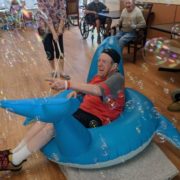“Mind after Midnight”— Why Our Brains Want to Go to Sleep Earlier

You’ve probably heard the saying, “nothing good happens after midnight.” Now new research shows there may be some truth to going to sleep earlier rather than staying up late.
A new study published in the journal Frontiers in Network Psychology suggests that the mind is not “designed” to be active after midnight.
The research goes on to say the mind doesn’t work the same way at night as it does during the daytime. And those physiological changes at night can lead to “psychiatric disorders and unsafe behaviors.”
“I think everyone knows that getting good sleep is important for thinking clearly and making good decisions, mostly because we’ve all felt stupid and made bad choices after a bad night of sleep,” said Andrew Tubbs, one of the study’s authors from the University of Arizona College of Medicine in a recent interview. “But the amount of sleep you have is just one part of a bigger puzzle because sleep happens in the context of our circadian rhythms, the 24-hour cycles in which we live our lives.”
Mind over Matter
According to Tubbs, “People are more likely to make bad decisions when they haven’t had enough sleep and they’re awake when their circadian rhythms are telling them to be asleep. For most people, that’s between 2 and 3 AM.”
The study does point out that many people reported that their creativity spikes after midnight. Tubbs said this fits into their Mind after Midnight hypothesis. “We think that one of the big drivers of risk is behavioral disinhibition, such that people say or do things they wouldn’t ordinarily do. For someone creative, this disinhibition may help them turn off their inner critic and push forward with new and exciting ideas.”
Tubbs also added that there is very little data on what people do in the middle of the night. The study suggests further research is needed to explore the effects of nighttime activity on mental health.
About Advena Living
Whether you’re a night owl, early bird or self-proclaimed exhausted pigeon, there’s a place for you at our Advena Living communities. We’ll encourage a restful night’s sleep but we won’t tell you when you have to go to bed. That’s because we honor choice and we believe that community members get to have a say in how they live their lives.
We will work hard to accommodate what you want your schedule to be every day. If you typically wake up at 6 AM and start your day off with a fresh cup of coffee and a newspaper, we’ll make that happen. Similarly if you’d rather sleep in and ease into your day, we’ll help you with that too.
Advena Living specializes in skilled nursing, long-term care, rehabilitation and assisted living services throughout the state. Our name “Advena” means newcomer. We welcome newcomers seeking a senior living environment where they may continue to enjoy a full life, as well as passionate employees who want to feel fulfilled in their careers.




















